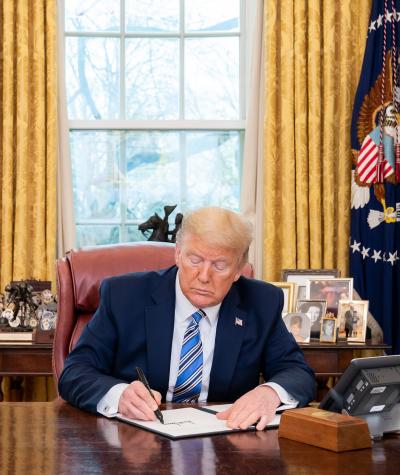Former president Donald Trump issued pardons during his final hours of office that confirm his legacy of pardoning public corruption. Although part of his legacy will be pardons for his political allies and cash for clemency, an underlying and unprecedented theme of his pardons is the removal of accountability for officials who committed crimes while public servants.
This legacy demonstrates the lack of meaningful consequences for misuse of public office and chips away at our democracy by diminishing the public’s trust in government.
During his presidency, Trump granted clemency to 15 former officials who were convicted of crimes connected to their public service at the federal, state, and local levels of government.
The officials were two former White House advisors, six former U.S. House Representatives, three former federal political appointees, a former California state assemblyman, a former Palm Beach County commissioner, a former Detroit mayor, and a former Illinois governor.
To understand the significance of these pardons, it is helpful to understand the difficulty of convicting public officials for criminal activity in the first place and the rarity of presidents erasing those convictions.
The challenge with prosecuting officials begins with the fact that many of the most corrupt activities may never come to light. Also, much of what the public considers corrupt is actually legal, such as wealthy donors who provide unlimited and undisclosed contributions to support officials who act in their interest.
Even if the corrupt activity is known, sufficient evidence may not exist to warrant prosecution. In the subset of cases where the law is violated and prosecutors have enough evidence to bring a case, a conviction is far from guaranteed.
For example, over the past decade, federal prosecutors brought numerous unsuccessful prosecutions of high-profile officials involving former senator Ted Stevens, former senator John Edwards, Sen. Robert Menendez, and former Virginia governor Bob McDonnell.
The few successful cases included the prosecution of Rep. Duncan Hunter for stealing $250,000 from his campaign and Rep. Chris Collins for insider trading related violations. Both pleaded guilty to the crimes, but both received pardons from Trump.
To be clear, past presidents have also pardoned corrupt officials. Former president Gerald Ford pardoned former president Richard Nixon for his role in the Watergate scandal and the controversy is credited with helping former president Jimmy Carter defeat Ford in the 1976 election.
Former president Bill Clinton granted clemency to two Illinois congressmen and an Arizona governor. Former president George H.W. Bush pardoned Caspar Weinberger, the defense secretary and Robert McFarlane, the national security advisor, involved in the Iran Contra scandal.
Former president Harry Truman pardoned a mayor, a governor, and two congressmen. Former president Hebert Hoover pardoned a governor and congressman.
Despite these examples of pardons of corrupt officials, Trump’s 15 clemency actions are extraordinary in modern history.
It matters that Trump exercised his presidential prerogative to pardon corrupt public officials because one of the most disheartening results for those interested in the integrity of government is to witness a lack of accountability, especially due to a pardon that effectively excuses and approves of the conduct.
When public officials play a part in corrupt actions, there are calls for more effective laws to prevent future offensive practices. When anti-corruption laws are strong, there are calls for more aggressive enforcement against those who appear to be above the law.
In the instances when there are strong laws and effective enforcement, a pardon can cause the public to lose faith in the integrity of government.
One of the lessons learned from Trump’s whitewashing of corruption is the continued importance of law enforcement agencies, ethics commissions, and watchdog groups.
These entities must continue to inform voters by providing transparency of corrupt practices and holding public officials accountable. If we maintain a strong democracy, empowered voters can remove corrupt officials from office and increase the public’s trust.
Former Public Officials Who Received Clemency From Trump
- Rod Blagojevich, former Illinois governor
- Chris Collins, former U.S. Rep
- Robert Coughlin, former Department of Justice (DOJ) official
- Duke Cunningham, former U.S. Rep
- Michael Flynn, former national security advisor
- Robin Hayes, former U.S. Rep
- Duncan Hunter, former U.S. Rep
- Bernard Kerik, former interim minister of interior of Iraq
- Kwame Kilpatrick, former Detroit mayor
- Scooter Libby, former vice presidential advisor
- Mary McCarty, former Palm Beach County commissioner
- Pat Nolan, former California state assemblyman
- Rick Renz, former U.S. Rep
- David Safavian, former chief of staff, General Services Administration (GSA)
- Steve Stockman, former U.S. Rep

